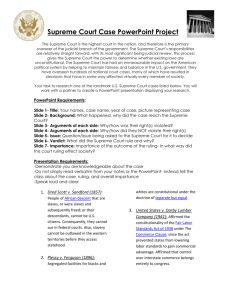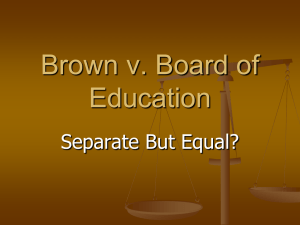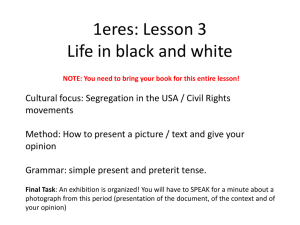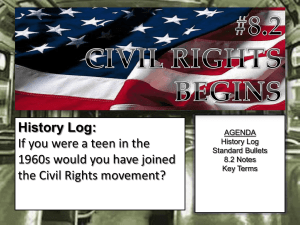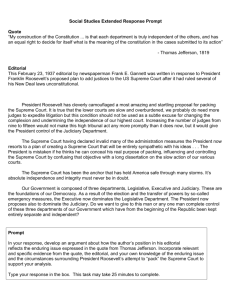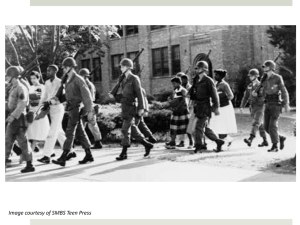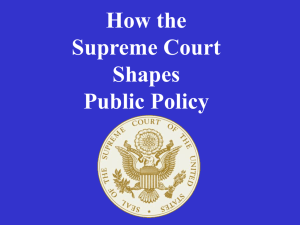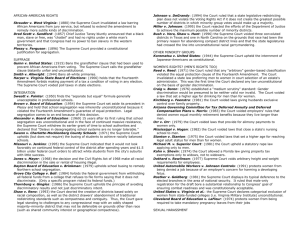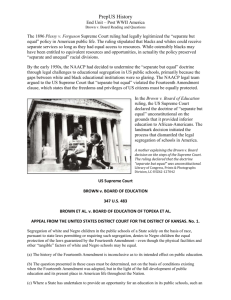The Civil Rights Movement
advertisement
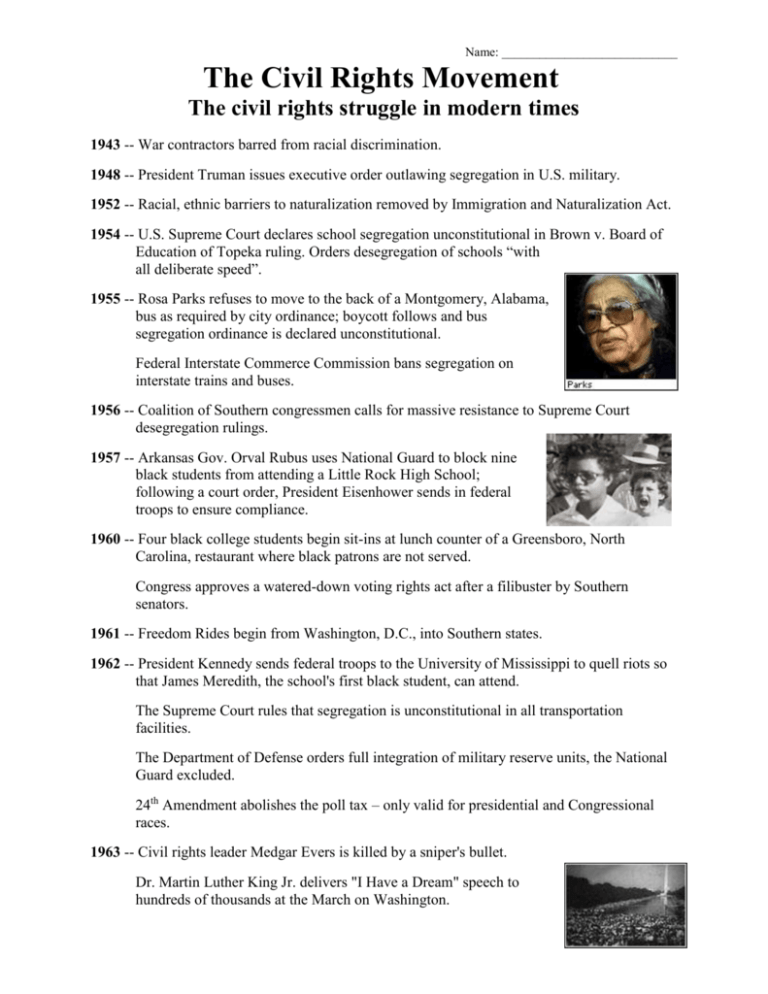
Name: ____________________________ The Civil Rights Movement The civil rights struggle in modern times 1943 -- War contractors barred from racial discrimination. 1948 -- President Truman issues executive order outlawing segregation in U.S. military. 1952 -- Racial, ethnic barriers to naturalization removed by Immigration and Naturalization Act. 1954 -- U.S. Supreme Court declares school segregation unconstitutional in Brown v. Board of Education of Topeka ruling. Orders desegregation of schools “with all deliberate speed”. 1955 -- Rosa Parks refuses to move to the back of a Montgomery, Alabama, bus as required by city ordinance; boycott follows and bus segregation ordinance is declared unconstitutional. Federal Interstate Commerce Commission bans segregation on interstate trains and buses. 1956 -- Coalition of Southern congressmen calls for massive resistance to Supreme Court desegregation rulings. 1957 -- Arkansas Gov. Orval Rubus uses National Guard to block nine black students from attending a Little Rock High School; following a court order, President Eisenhower sends in federal troops to ensure compliance. 1960 -- Four black college students begin sit-ins at lunch counter of a Greensboro, North Carolina, restaurant where black patrons are not served. Congress approves a watered-down voting rights act after a filibuster by Southern senators. 1961 -- Freedom Rides begin from Washington, D.C., into Southern states. 1962 -- President Kennedy sends federal troops to the University of Mississippi to quell riots so that James Meredith, the school's first black student, can attend. The Supreme Court rules that segregation is unconstitutional in all transportation facilities. The Department of Defense orders full integration of military reserve units, the National Guard excluded. 24th Amendment abolishes the poll tax – only valid for presidential and Congressional races. 1963 -- Civil rights leader Medgar Evers is killed by a sniper's bullet. Dr. Martin Luther King Jr. delivers "I Have a Dream" speech to hundreds of thousands at the March on Washington. Church bombing in Birmingham, Alabama, leaves four young black girls dead. City becomes the focus of MLK’s non-violence campaign. President Kennedy is assassinated while traveling through Dallas, Texas. Lee Harvey Oswald was arrested shortly after, and then killed by a civilian while in police custody. (“At the beginning of 1963, nine years after this historic decision [Brown v. Board of Education], approximately 9 percent of southern Negro students were attending integrated schools. If this pace were maintained, it would be the year 2054 before integration in southern schools would be a reality” – Martin Luther King Jr., Why We Can’t Wait) 1964 -- Congress passes Civil Rights Act of 1964 declaring discrimination based on race illegal after 75-day long filibuster. Three civil rights workers disappear in Mississippi after being stopped for speeding; found buried six weeks later. 1965 -- March from Selma to Montgomery, Alabama, to demand protection for voting rights; two civil rights workers slain earlier in the year in Selma. Malcolm X assassinated. He preached black pride and economic self-reliance for African Americans. Riot in Watts, Los Angeles. New voting rights act signed. 1966 -- Edward Brooke, R-Massachusetts, elected first black U.S. senator in 85 years. 1967 -- Thurgood Marshall first black to be named to the Supreme Court. Carl Stokes (Cleveland) and Richard G. Hatcher (Gary, Indiana) elected first black mayors of major U.S. cities. 1968 -- Martin Luther King Jr. assassinated in Memphis, Tennessee; James Earl Ray later convicted and sentenced to 99 years in prison. Poor People's March on Washington -- planned by King before his death -- goes on. Civil Rights Act of 1968—banned discrimination in the sale or rental of housing (also called the Fair Housing Act) 1973 -- Maynard Jackson (Atlanta), first black elected mayor of a major Southern U.S. city. 1975 --Voting Rights Act extended. 1978 -- Supreme Court rules that medical school admission programs that set aside positions based on race are unconstitutional (Bakke decision). 1979 -- Shoot-out in Greensboro, North Carolina, leaves five anti-Klan protesters dead; 12 Klansmen charged with murder. 1983 -- Martin Luther King Jr. federal holiday established. 1988 -- Congress passes Civil Rights Restoration Act overriding President Reagan's veto. He had vetoed the law saying it gave the federal government overreaching powers. 1989 -- Army Gen. Colin Powell becomes first black to serve as chairman of the Joint Chiefs of Staff. 1989 -- L. Douglas Wilder (Virginia) becomes first black elected governor. 1990 -- President Bush vetoes a civil rights bill he says would impose quotas for employers; A civil rights bill without quotas passes in 1991. 1991 -- Civil rights museum opens at King assassination site in Memphis. 1994 -- Byron De La Beckwith convicted of 1963 Medgar Evers assassination. 1995 -- Supreme Court rules that federal programs that use race as a categorical classification must have "compelling government interest" to do so. 1996 -- Supreme Court rules consideration of race in creating congressional districts is unconstitutional. 2003 -- The Supreme Court upholds the University of Michigan Law School's policy, ruling that race can be one of many factors considered by colleges when selecting their students. 2005 -- Edgar Ray Killen, the leader of the Mississippi murders (1964), is convicted of manslaughter on the 41st anniversary of the crimes.
